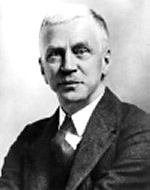Page Content
The ATA archives contains dozens of documents related to the Thomas Richards case, including letters, memoranda, postcards and legal summaries.
| Leading up to its official 100th anniversary in June 2018, the Alberta Teachers’ Association is celebrating its history through a number of initiatives, one of which is this column. Curated by archivist Maggie Shane and appearing in each issue of the ATA News this year, this column will feature significant moments and individuals in the Association’s history as well as interesting artifacts or documents from the Association’s archives. |
Monday morning of Oct. 27, 1930, dawned brisk and bright. At the beginning of another busy week, the usual work of the Alberta Teachers’ Alliance bustled on in its offices in Edmonton’s Imperial Bank building. Meetings were underway, letters were being typed, draft articles for the ATA Magazine were being scratched out on foolscap. But on this particular Monday morning a telegram arrived announcing an important and hard-won victory.
Solicitor Oliver Mowat Biggar had sent a wire from Ottawa to advise that the Alliance had succeeded before the Supreme Court of Canada. Biggar’s arguments that former principal Thomas Richards had been denied his common law right to sue his employer for damages following his wrongful dismissal had prevailed. The stakes being the legal rights of teachers everywhere, the Alliance and its local solicitor George Van Allen had retained the venerable Biggar, a luminary in Alberta and Ontario law courts, to argue the case before the Supreme Court.
|

ATA Archives
Oliver Mowat Biggar, solicitor
|
In August of 1928, school principal Thomas Richards returned from summer vacation to discover he had been dismissed without proper notice and replaced. Richards had not received severance and was without a position for some time. He was eventually compelled to accept a position at a greatly reduced salary.
The Alliance launched a lawsuit against the Athabasca School Board on Richards’ behalf for damages arising from breach of contract. As general secretary-treasurer John Barnett later reported in the ATA Magazine, over the next two years the case wound through two Alberta appeals courts. Those courts found that, although the board had violated the contract, the only remedy available to Richards was an appeal to the minister of education for reinstatement under section 196 of the School Act. Undaunted, the Alliance relentlessly pursued Richards’ right to sue for damages under common law.
Convinced that its theory of the case was correct, the Alliance expended significant resources to bring the case before the Supreme Court. Enter Biggar, who argued the case on Tuesday, Oct. 14, 1930. Biggar maintained that section 196 of the School Act only applied in cases of summary dismissal or suspension for “gross misconduct, neglect of duty or refusal to obey a lawful order of the Board.”
The school board, Biggar asserted, had no such complaints against Richards. Therefore, the statute was moot and the court must safeguard Richards’ right to sue for damages under common law.
Writing for the Court, Chief Justice Sir Lyman Poore Duff determined that Richards was “entitled to be placed in the same position (so far as that can reasonably be done by pecuniary reparation) as if the contract had been performed….”
The judgment was significant and applied to every teacher in the Dominion.
“[The judgment] affirms definitely the teachers’ ordinary common law right to sue for damages when wrongfully dismissed without change being necessary in the statute,” Barnett wrote in 1930.
Gone their separate ways
Van Allen was elected the Liberal Party’s member of the legislative assembly for Edmonton in 1935. He died in office at the age of 46 on June 15, 1937.
Biggar had a varied and stellar legal career with connections to Edmonton, Alberta, Ontario and Europe. He was an original member of the Edmonton legal firm Woods, Sherry, Collins and Field, founded in 1915.
Having enlisted with the 101st Regiment upon the outbreak of the First World War in 1914, Biggar was a full colonel and serving as Canada’s second judge advocate general by 1919. He attended the peace conferences in Paris and Versailles at the conclusion of the war as chief legal adviser to the Canadian delegation under appointment by Prime Minister Sir Robert Borden. Biggar was thereafter appointed Canada’s first chief electoral officer in 1920. He died in Ottawa in 1948 at the age of 71.
Today the law firm of Woods, Sherry, Collins and Field is known as Field Law. Its talented and dedicated attorneys (nicknamed “Fielders”) have represented and advised the Association since the closing days of the Second World War. Field Law celebrated its centennial in 2015.
Thomas Richards left Alberta some time after the conclusion of the school year in 1930. He returned to his birthplace of Little Bras D’Or, N.S., although he maintained his Alberta Teachers’ Alliance membership through to 1931. Richards retired from teaching in 1940 after a career of more than 40 years. He died at the age of 98 in Nelson, B.C. on Jan. 19, 1972. The ATA archives maintains Richards’ original membership cards and a copy of his death registration.
The ATA archives also holds the original correspondence and notes related to the Richards case. They make for interesting reading and engender a deep appreciation for Van Allen’s and Biggar’s legal talent and acumen. Alas, the original telegram did not survive.
